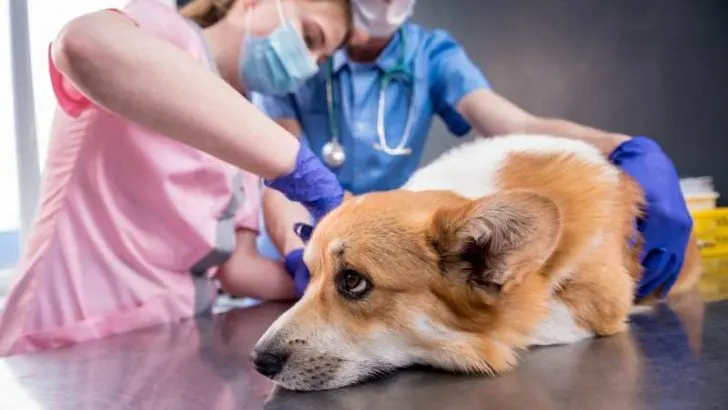Dogs, in general, are a big responsibility. It may seem as if they just need food and shelter to be happy and healthy, but as most dog owners know, it’s a lot more complicated than that.
The part that needs the most attention is health. What if your dog starts vomiting a couple of times a day and seems bloated and in pain? The simple conclusion is that it has eaten something bad and is now having a reaction to it. But it can be more serious than that.
The vomiting and bloating can be symptoms of an inflamed pancreas, which is the subject we plan on covering today. The seemingly mundane symptoms may not seem severe at first, which is why you need to know about them.
But before we start, let’s ask another question – is this something that we Corgi owners need to worry about? Are Corgis prone to pancreatitis? Let’s find out.

Are Corgis Prone To Pancreatitis?
The answer to this question is not a simple yes or no. While there are no breeds that are predisposed to suffering from pancreatitis, some are more prone to things that can cause it. So we suppose that NO, Corgis are not prone to the disease.
But any dog, no matter the breed, can develop this condition. This means that you need to know how to make sure that your dog is in good health at all times. And yes, that means healthy diet plans and plenty of exercises.
See, one of the problems that Corgis have is that they can quickly gain weight. This is not a breed-specific trait but a size-specific one – all smaller dogs gain weight quickly! Now, we know that Corgis aren’t precisely a toy breed, but they’re still small.
Also, their stature and the way they’re built means that any weight they gain that pushes them over the average number gives them bone, heart, and breathing problems.
But let’s not stray too far from the main subject; what is pancreatitis?
Pancreatitis is an inflammation of a vital organ called the pancreas. The word ‘vital’ is essential here, as the body needs it to function properly. For example, the pancreas creates enzymes that help the body digest foods and hormones like insulin that your dog needs to regulate blood sugar and glucose in the metabolism.
So what happens when the pancreas becomes inflamed?
Well, you see, the enzymes that this organ produces help the body break food down to pick apart the resources that it offers. The inflammation means that these enzymes get released too early and before they reach the targeted food. So early that the said enzymes start breaking down the pancreas itself.
This makes your Corgi’s body go into ‘red alert mode’. As a result, your dog starts throwing up food because the organism figured out that processing is impossible. Furthermore, the pancreas will continue to make enzymes if there’s undecomposed food present in the digestive tract.
Pancreatitis is usually spontaneous, meaning that any dog, no matter the breed, sex, or age, develops it. It basically means that the pancreas started dysfunctioning on its own, and there’s little to nothing that the body can do to stop it. So knowing what the symptoms look like is crucial and could save your dog’s life.

How To Spot Pancreatitis?
While pancreatitis is spontaneous, the symptoms can be pretty straightforward and obvious. So you or your vet should have no problems catching it in time. Of course, it’s still a severe condition, so immediate action is needed, but knowing what you’re dealing with is a crucial start!
Let’s take a look at the symptoms:
Vomiting
As we already mentioned, vomiting is one of the first symptoms that your Corgi will experience. This is because the body has realized that the pancreas is not properly functioning, and it is putting new food on hold until further notice. Unfortunately, this means that your dog will get the urge to throw up every time it eats fresh food.
Your Corgis organism is simply trying to protect the pancreas as much as possible, and it is up to you to do the rest that is needed to heal it properly!
Anorexia
The next step in this process is the beginning of anorexia. It’s simple because the body rejects any new food but still tries to survive, your dog will start losing weight quickly. Of course, the fact that there is no caloric intake present makes the weight go down, but that is not the only problem.
The body never gives up trying to survive too easily. It will start breaking down the next best source, which firstly the muscles and then the fats. If you notice that your Corgi is losing weight drastically, notify your vet immediately as this can be an emergency if pancreatitis is at fault.
Your dog needs to get an IV drip attached immediately.
Depression
Like with all severe illnesses and injuries, your dog will have problems with depression at this time. This could be the sign that you notice if you haven’t already seen the other symptoms. Corgis are loud and playful animals, so the symptoms of depression will most definitely stick out.
Abdominal Pain
Because of all the things happening to your dog in the abdomen area, there is bound to be some pain involved. With it will come bloating, and the whole area will be sensitive to touch.
Diarrhea
The final of the main symptoms that we feel need to get mentioned is diarrhea. Basically, the food that your dog doesn’t manage to throw up immediately won’t get digested well. So not only does it wreak havoc on the pancreas, but the digestive tract will also try to get rid of it as soon as possible, which will cause diarrhea.
Because of their size, Corgis suffering from diarrhea get dehydrated quickly, which is another reason to contact your vet if you haven’t already.

How Is Pancreatitis Diagnosed?
Once you figure out that there’s something wrong with your Corgi, your vet will decide which tests to run and make a diagnosis. So what are these tests? Are they painful for your puppy?
Fortunately, most of these tests are not painful for your dog, but pancreatitis may not be the first presumption your vet will make. Other conditions need to get ruled out as well.
Abdominal Ultrasound
This may not be the first test your vet will run, but it’s an important one. While ultrasounds can indeed show whether or not your dog is suffering from pancreatitis, it isn’t always as effective; let us explain.
If the vets manage to spot pancreatitis with an abdominal ultrasound, there will likely be no more suspicion, and the diagnosis will be considered valid. But in 32% of dogs, the pancreas may seem completely normal in the ultrasound. Don’t worry though, your vet will, in this case, continue to run tests until a diagnosis is reached.
Abdominal X-Ray
An X-Ray of the abdominal area most likely won’t be enough to prove that your Corgi is suffering from pancreatitis. However, it is crucial to exclude other serious conditions that share the same symptoms as pancreatitis.
This is usually the first test vets do in such situations.
Blood Work
Doing a complete blood work analysis is crucial with any sort of potential disease. For example, a total blood count and biochemical profile can show if the pancreatitis is causing the other vital organs to malfunction.
Again, this is not the test that will prove or disprove the diagnosis; but it is a crucial piece of the puzzle.
Urinalysis And Urine Culture
Just like the blood work, a urinalysis and urine culture can show how other vital organs are functioning and in what shape the organism is as a whole.
Canine Pancreatic Lipase Immunoreactivity (cPLI)
The cPLI is one of the definitive tests that your vet can run for a pancreatitis diagnosis. It is usually run after other clues reared their heads after check-in the ultrasounds and X-Rays.
Again, like with many tests, just because it is very accurate, the results still can’t 100% prove that you’re, in fact, suffering from pancreatitis.
Treatment
Treating pancreatitis is not simple because it’s not always clear why it happened. See, this condition is not chronic, though if not treated in time, it can be. It’s a pancreatitis attack that will pass, but after it does, it’s up to the vets and you to make sure it doesn’t happen again.
Pancreatitis can occur because of an unhealthy diet, but it’s important to remember that it can happen spontaneously. Once the vet manages to make a diagnosis, they will shift their focus to making the dog as comfortable as possible until the attack passes. The attack can be severe, but it can be mild as well.
Depending on this, they will either keep your Corgi in the hospital until the attack completely passes (if it’s a severe one), or you will take care of them at home.
Either way, the vet will probably suggest a day or two with no food (your Corgi will be on an IV drip, don’t worry)/ After this, an extremely low-fat diet will be implemented. Low-fat diets are essential for pancreatitis since they give the pancreas a chance to rest after the attack.

Pancreatitis In Corgis: Final Words
Pancreatitis has no breed, sex, or age preferences. This condition can be very serious, and it can happen to your Corgi as much as it can happen to a Chihuahua or a Lab. The most important thing is to be prepared and to know what the symptoms look like.
Make sure you have a vet that you trust on speed dial for situations like these. And never wait for an emergency like this to start helping your Corgi lead a healthy life. The healthier they are, the more equipped they will be if emergency strikes!
Learn More: Corgi Health Problems: Most Common Diseases In Corgis

